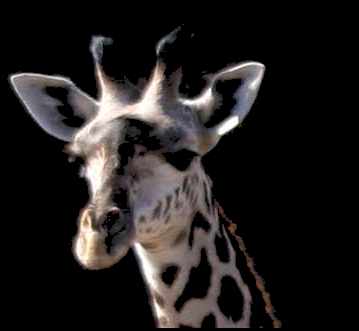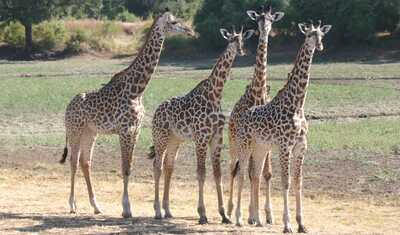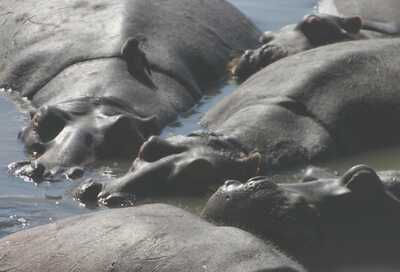

Walking in the bush is a completely experience different from that gained bouncing around in the back of a vehicle. In addition to the Lodge’s guide, you are also accompanied by one of the National Park’s Scouts. You walk in single file - so the Guide and Scout know where you are - led by the armed Scout. At the Bush Camp his name was "Danger" and we weren’t sure whether this was reassuring or not. His job is to deal with any situation that arises with an animal and the Guide is responsible for looking after the guests. The basic response is not to run, stand you ground and retreat slowly - luckily I’ve never seen this in practice. This is mainly because no matter how quietly you try to move, animals hear you coming and move away or hide away. This means that walks main focus on the smaller animals and the bush itself. On our various walks we leant about the life cycle and habits of three types of termite, how to recognise different types of dung and what Jackalberrys tasted like; watched Hippos wearing water lilies as hats, Giraffes who seemed just as interested in us as we were in them and squabbles of Baboon families.

After three days it’s time for me to leave and, with an English couple on their honeymoon and a girl from Austria who was working to make local magistrates and official more aware of domestic violence issues, bump and rattle our way back to Kafunta. The main Lodge didn’t have any spare beds, so I intended to go and stay at the Flatdogs campsite located on the river bank by the main Park entrance by Mfuwe village. But first I had to overcome the flat battery in the Disco. Leads from the Lodge’s workshop brought some jump-leads but they had such poor connections that they couldn’t provide enough juice. A push start down a slight slope didn’t work either. In the end, I broke out the towrope and a pull along in 3rd gear eventually dragged the engine into life. Down to check that Flatdogs did have a pitch for my tent leaving the engine running and then a run to the airport & back - 30 miles - to try a put some spark back in the batteries. From now on I’ll make sure I that I turn off the master switch whenever I leave the Disco for any time.
Flatdogs is a local slang crocodile and the original camp was located a bit further up the river close to a croc farm. It sits on the bank of the river and has a selection of accommodation and a large camping area that includes a number of platforms up in the trees upon which you can erect your tent. The whole areas is unfenced and going to the toilet in the night, I almost walked into a Hippo grazing by the toilets. The next morning after having a shower, I had to await for a big bull Elephant to move away from my tent. One of the more impressive conveyances parked under the trees was a German registered motorcycle with a small sidecar supporting a big water radiator, an intercooler and an impressive array of storage boxes.

On the bumpy journey back to Chipata I had the company of Tina, the Austrian girl who I’d met at Bush Camp. She had arrived in the Valley by way of an expensive taxi ride and my Disco was a free alternative. She had phoned the previous night to cancel her taxi but one still turned up so she had to negotiate with the driver and ended up paying him a fraction of the costs - he would remain in town and try to get a local fare back to Chipata. With company, the journey went faster and, after driving around Chipata getting conflicting advice from local, she managed to buy a ticket and board her bus for Lusaka just before its departure.
Driving around Africa you regularly see domestic animals on and by the side of the road. Different animals react in different ways to your approach. Cows ignore you and reluctantly wander slowly away. Goats are aware of you approach and run off the road. Dogs will often chase you barking. During the journey Tina told me a local story to explain these differences. A dog, cow and goat took a bus journey. The cow had the right money and paid the conductor. The dog didn’t and the conductor said he would give him his change as soon as he had it. The conductor missed the goat who ended up not paying. At the end of the journey, the cow disembarked, the goat sneaked off and disappeared into the crowd and the bus drove off before the dog received his change. From then on cows aren’t bothered by buses on the road and amble slowly away. Goats run away just in case somebody comes looking for the fare they owe and dog chase the bus because they still haven’t received the change they are owed.
| Go Back | Home | Next - Malawi |